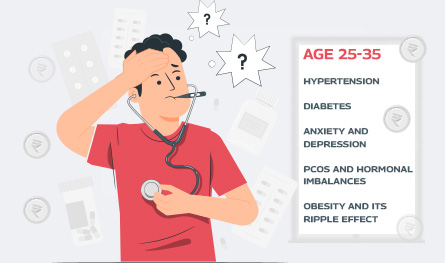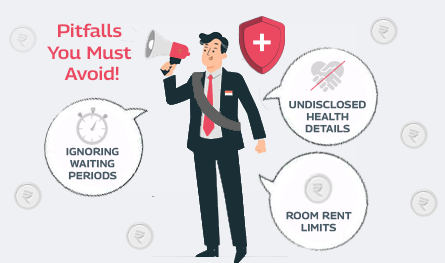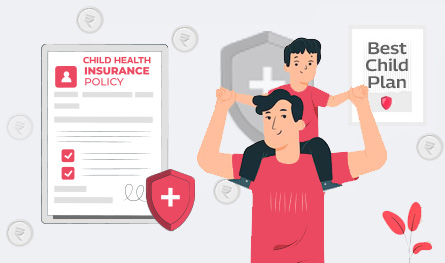What Lifestyle-Related Diseases Are Most Common Among the 25-35 Age Group?

If you think lifestyle-related health issues only show up after 40, think again. Youth no longer guarantees immunity. Today’s 25 - 35 age group is increasingly facing medical issues that only plague older adults. The reason? Long working hours at the desk, deliveries on speed dial, and a social life that rarely includes a decent amount of sleep are some of the reasons for the early onset of medical conditions like diabetes, anxiety, and hypertension.

As more and more of these issues become the trend, the need for early intervention, preventive care, and financial protection arises. That’s where health insurance plans come into play – not just as a fallback option but as a part of the overall smart financial plan. Many young adults are turning to expert-backed online platforms like Paybima to choose the right health insurance coverage. But what exactly are the most common lifestyle diseases that are affecting the 25 – 35 age group? Let’s dive deep
Top 5 Lifestyle-related ailments that are prevalent in the 25-35 age group:
Here are the most common types of lifestyle-related diseases that all 20s and 30s need to be wary of:
1. Hypertension: The Silent Early Bird
Once considered to be a midlife concern, hypertension is increasingly becoming common among young adults. High work pressure, poor diet, and long sedentary hours are pushing the 25 – 35 age group into risky territory early in their life. The scariest part? It often shows minimal to low physical symptoms until something serious hits. Left unchecked, this can lead to serious complications later in their life. That’s why regular check-ups aren’t just for the elderly anymore – young professionals are opting for health insurance plans to cover diagnostics and medication for these problems.
2. Diabetes: A Growing Concern
Gone are the days when diabetes was something you worried about after retirement. Today, it is frequently showing up in the bloodwork of 25- to 35-year-olds. Blame it on desk jobs, sugar-laced snacks, or the glorified hustle culture that leaves very minimal time for proper movement or meals. Both Type 1 and Type 2 diabetes are common – while one is genetic, the other one is largely lifestyle-driven. The tricky part? It creeps in slowly without anyone noticing major impacts until things get serious. Lifestyle changes and regular monitoring are the keys here.
3. Anxiety and Depression: The Quiet Epidemic
You would think that with all the motivational podcasts and social media influencers, young adults would be thriving in their lives. But that’s rarely the scenario. Behind the curated Instagram and Facebook stories and productivity hacks, a mental crisis is brewing. Anxiety and depression have reportedly become alarmingly common among this generation – constantly fuelled by burnout, social pressure, and a need to “keep up”. The stigma may be fading, but the struggle is real – and getting the correct help early makes all the difference. That’s why more young adults are turning to health insurance plans for therapy, medication and other support.
4. PCOS and Hormonal Imbalances: More Common Than You Think
For many women in their 20s and 30s, irregular periods, chronic fatigue, and sudden weight changes aren’t just annoyances – they could be signs of something more serious, like PCOS (Polycystic Ovary Syndrome). Hormonal imbalances are showing up more frequently among young adults, and experts are pointing to multiple lifestyle factors like poor diet, stress, sleep disruptions, lack of exercise, and even environmental toxins as likely contributors.[1] The problem is that managing these conditions requires more than just a quick fix. Choosing health insurance that covers such treatments is becoming more and more important each day.
5. Obesity and Its Ripple Effect: Beyond the Numbers on the Scale
Obesity is no longer just a cosmetic concern – it is becoming a serious health problem that’s creeping into the lives of more young people each day. With hectic work schedules, poor dietary choices, and limited time available for exercise, many professionals in the 25 – 35 age group are gaining weight faster than they can manage. While it initially does not seem to be a big issue, the risks associated with obesity are not limited just to feeling sluggish or out of shape. Obesity is often followed by a range of serious healthcare issues ranging from joint pain to diabetes and heart problems. Addressing obesity takes more than just a doctor visit, it requires consistent lifestyle changes.

Author Bio
Paybima Team
Paybima is an Indian insurance aggregator on a mission to make insurance simple for people. Paybima is the Digital arm of the already established and trusted Mahindra Insurance Brokers Ltd., a reputed name in the insurance broking industry with 21 years of experience. Paybima promises you the easy-to-access online platform to buy insurance policies, and also extend their unrelented assistance with all your policy related queries and services.
Latest Post

Health insurance plans are purchased with the hope of medical protection in times of need. However, sometimes it ends up being a source of surprise and disappointment. This mostly happens when people rush to buy health insurance plans, often overlooking essential aspects. Ignoring waiting period clauses, misunderstanding exclusions, and being unaware of sub-limits can lead to unwanted problems in the future.


Term insurance is an important investment. However, with the availability of so many insurers offering term plans, it becomes difficult to select the best term plan to suit your needs. Buying a term plan needs some consideration and research on the part of the policyholder. In this post, let us discuss the best term insurance providers in India.


If you think of life insurance, chances are you are picturing something people buy in their 30s or 40s. But what if you are 65 or older and just getting started? The good news is that you are never too late. Whether you are thinking of easing the financial burden on your family, covering final expenses, or simply leaving behind a legacy, there are life insurance options tailored just for you.
This article will be a guide to life insurance for senior citizens above 65 years, explaining why it is important, the type of insurance options, and how to get the right policy for you.


As any parent will tell you, kids come with two things: endless energy and absolutely no sense of self-preservation. From scaling chairs and tables like mountaineers to catching germs within a five-mile radius, kids really know how to keep everyone on their toes. Now, it is understandable you are worried. As much as we would love to wrap our small ones in cotton wool and keep them safe forever, real life has other plans.

.png)
It is very important to know the car insurance cost in India so that you can find the affordable policy that you are looking for in this case.




